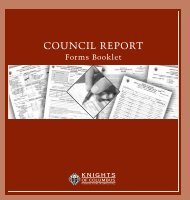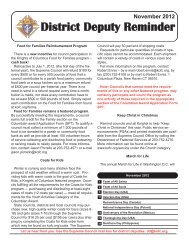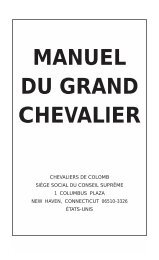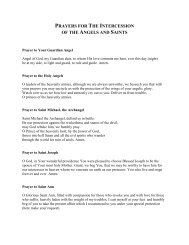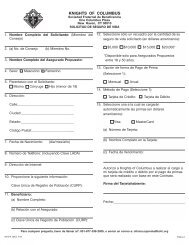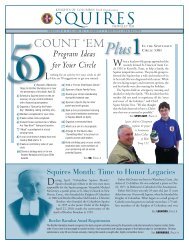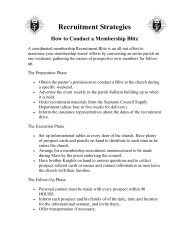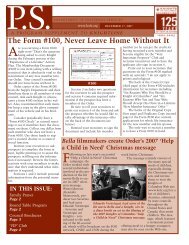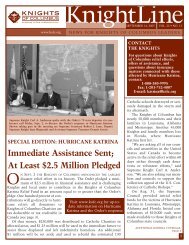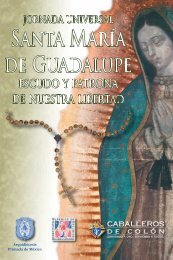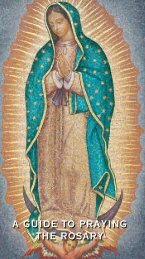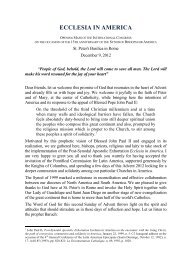CATHOLIC WORD BOOK - Knights of Columbus, Supreme Council
CATHOLIC WORD BOOK - Knights of Columbus, Supreme Council
CATHOLIC WORD BOOK - Knights of Columbus, Supreme Council
You also want an ePaper? Increase the reach of your titles
YUMPU automatically turns print PDFs into web optimized ePapers that Google loves.
need. It means freedom from unreasonable<br />
attachment to material things as ends in<br />
themselves, even though they may be<br />
possessed in small or large measure. (2)<br />
One <strong>of</strong> the evangelical counsels pr<strong>of</strong>essed<br />
as a public vow by members <strong>of</strong> an institute<br />
<strong>of</strong> consecrated life. It involves the<br />
voluntary renunciation <strong>of</strong> rights <strong>of</strong><br />
ownership and <strong>of</strong> independent use and<br />
disposal <strong>of</strong> material goods; or, the right <strong>of</strong><br />
independent use and disposal, but not <strong>of</strong><br />
the radical right <strong>of</strong> ownership. Religious<br />
institutes provide their members with<br />
necessary and useful goods and services<br />
from common resources. The manner in<br />
which goods are received and/or handled<br />
by religious is determined by poverty <strong>of</strong><br />
spirit and the rule and constitutions <strong>of</strong><br />
their institute.<br />
Pragmatism: Theory that the truth <strong>of</strong> ideas,<br />
concepts and values depends on their utility<br />
or capacity to serve a useful purpose rather<br />
than on their conformity with objective<br />
standards; also called utilitarianism.<br />
Prayer: The raising <strong>of</strong> the mind and heart<br />
to God in adoration, thanksgiving,<br />
reparation and petition. Prayer, which is<br />
always mental because it involves thought<br />
and love <strong>of</strong> God, may be vocal, meditative,<br />
private and personal, social, and <strong>of</strong>ficial.<br />
The <strong>of</strong>ficial prayer <strong>of</strong> the Church as a<br />
worshipping community is called the<br />
liturgy.<br />
Precepts: Commands or orders given to<br />
individuals or communities in particular<br />
cases; they establish law for concerned<br />
parties. Preceptive documents are issued<br />
by the pope, departments <strong>of</strong> the Roman<br />
Curia and other competent authority in<br />
the Church.<br />
Presence <strong>of</strong> God: A devotional practice <strong>of</strong><br />
increasing one’s awareness <strong>of</strong> the presence<br />
and action <strong>of</strong> God in daily life.<br />
Presumption: A sin against hope, by which<br />
a person striving for salvation (1) either<br />
relies too much on his own capabilities or<br />
(2) expects God to do things which he<br />
cannot do, in keeping with his divine<br />
attributes, or does not will to do,<br />
according to his divine plan. Presumption<br />
is the opposite <strong>of</strong> despair.<br />
Preternatural Gifts: Exceptional gifts,<br />
beyond the exigencies and powers <strong>of</strong><br />
human nature, enjoyed by Adam in the<br />
state <strong>of</strong> original justice: immunity from<br />
suffering and death, superior knowledge,<br />
integrity or perfect control <strong>of</strong> the passions.<br />
These gifts were lost as the result <strong>of</strong><br />
original sin; their loss, however, implied<br />
no impairment <strong>of</strong> the integrity <strong>of</strong> human<br />
nature.<br />
Pride: Unreasonable self esteem; one <strong>of</strong> the<br />
seven capital sins.<br />
Prie Dieu: A French phrase, meaning pray<br />
God, designating a kneeler or bench<br />
suitable for kneeling while at prayer.<br />
Priesthood: (1) The common priesthood <strong>of</strong><br />
the non ordained faithful. In virtue <strong>of</strong><br />
baptism and confirmation, the faithful are<br />
a priestly people who participate in the<br />
priesthood <strong>of</strong> Christ through acts <strong>of</strong><br />
worship, witness to the faith in daily life,<br />
and efforts to foster the growth <strong>of</strong> God’s<br />
kingdom. (2) The ordained priesthood, in<br />
virtue <strong>of</strong> the sacrament <strong>of</strong> orders, <strong>of</strong><br />
bishops, priests and deacons, for service to<br />
the common priesthood.<br />
-55-



